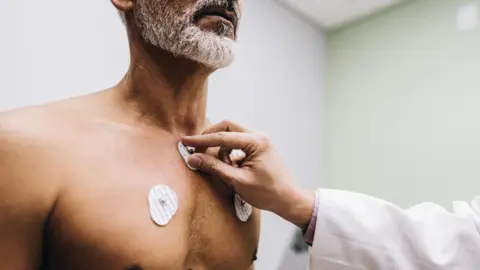BBC News, Digital Health Editor
 Getty Images
Getty ImagesTwo NHS hospital trusts in London are using AI technology to see if they can detect type 2 diabetes in patients up to 10 years before it develops.
Imperial College and Chelsea and Westminster Hospitals NHS Foundation Trust have begun training on an AI system called Aire-DM. The system checks a patient's ECG heart trace for subtle early warning signs that are difficult for doctors to detect using other methods.
Clinical trials are scheduled for 2025 to see if it works as expected.
early work This suggests that the system can detect risks approximately 70% of the time.
Lead researcher Dr. Fu Siong Ng said giving the AI additional details about other background risk factors, such as a patient's age, gender, whether they already have high blood pressure, and whether they are overweight, could improve predictive power. It is said that there is a sex.
“The ECG data alone is already pretty good, but adding that data makes it even better,” he told BBC News.
An ECG (electrocardiogram) records and can reveal problems with the heart's electrical activity, such as heart rate and rhythm.
Dr. Ng says the ECG changes detected by the system are too variable and subtle for even the most skilled doctors to interpret with the naked eye.
“It's not as simple as saying it's this part of an electrocardiogram. You're looking at a combination of subtle things.”
As part of the trial, up to 1,000 patients at both hospitals will have their ECG scans read by the AI system to see if it can help detect and predict the disease.
It is not yet offered regularly, but experts hope it will be rolled out more widely across the NHS. That could take more than five years, Dr. Ng says.
The British Heart Foundation, which is funding the research, says detecting people at risk of diabetes could ultimately save lives.
If uncontrolled, type 2 diabetes can lead to heart attacks and strokes.
Maintaining a healthy weight, eating a healthy diet, and exercising can help prevent complications.
Professor Brian Williams, chief scientific and medical officer at the British Heart Foundation, said: “This exciting research uses powerful artificial intelligence to analyze electrocardiograms and extract data from health data collected on a daily basis. We show how AI can identify the unobservable. This type of insight could have a huge impact on predicting the risk of developing type 2 diabetes in the future, years before the disease develops. It can make a difference.
“Type 2 diabetes is a rapidly growing health problem that increases the risk of developing heart disease, but with the right support, it is possible to reduce the risk of developing this disease. I look forward to seeing how technology is incorporated into healthcare.'' ”
Dr Fay Riley from Diabetes UK said: “Type 2 diabetes is often undiagnosed, sometimes for years. In the UK alone, 1.2 million people are unaware they have the disease, and millions more are unaware they have it. It is important to identify at-risk people early because they are at high risk of developing .
“AI-powered screening methods offer a promising new way to detect patients who are likely to develop type 2 diabetes years in advance, ensure they are receiving appropriate support and developing serious conditions such as heart failure and vision loss.” This will help prevent serious complications.”
What is type 2 diabetes?
Type 2 diabetes is a common condition in which sugar (glucose) levels in the blood become too high.
This occurs when the body cannot produce enough or properly use a hormone called insulin, which controls blood sugar.
In some cases, being overweight is also involved.
That's because fat can accumulate in and around the pancreas, the organ that makes insulin.
Type 1 diabetes, on the other hand, is an autoimmune disease.


